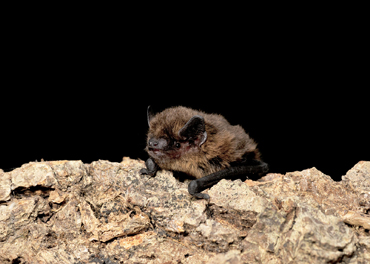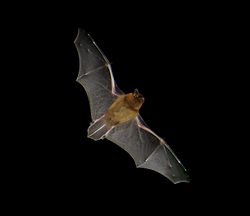The Partnership for Action against Wildlife Crime in Northern Ireland (PAW NI) has issued a reminder about the importance of protecting bats as they wake from their long winter hibernation.
[caption id="attachment_56371" align="alignleft" width="370"] The common pipistrelle bat (Photo by Hugh Clarke).[/caption]
The common pipistrelle bat (Photo by Hugh Clarke).[/caption]
The common pipistrelle is the most common bat in Northern Ireland, and is the smallest of the eight bat species found here. They vary between 35 and 45mm in length and three to six grams in weight – less than a 10p coin!
Although bats mate in the autumn, females do not become pregnant until they waken out of hibernation, so baby bats (also known as pups) are born mid-summer when there are plenty of insects for them to eat.
However, with fewer trees available for female bats to use for nursery roosts, these expectant mothers can sometimes decide people’s homes are a safe to have their pups.
Bats usually prefer to be outside, under the eaves, but can also sometimes find their way into attics. Not all bats within the roost have pups, but those who do only give birth to one pup per year. The bats do not bring nesting material or chew wires, they simply hang up and have their baby.
[caption id="attachment_56372" align="alignright" width="250"] A pipistrelle bat in flight.[/caption]
A pipistrelle bat in flight.[/caption]
They do not even bring food into the roost to feed the babies, as the pups are fed on mother’s milk. As soon as the pups are weaned they are straight outside on the wing hunting with their mothers.
Bats have a beneficial impact on the environment, eating insects which attack crops and carry diseases. In fact one tiny pipistrelle can eat 3,500 midges in a single night!
They have a very short window to feed and put on a third of their body weight before they again go into hibernation. Bats and their roosts are protected by the law and it’s an offence to disturb, capture, injure or kill a bat, as well as damage a roost even if it’s not in use.
For more information visit the Northern Ireland Bat Group website:
(NI Bat Group is part of the Partnership for Action against Wildlife Crime (PAW), a coalition of organisations working together to reduce wildlife crime by raising public awareness and promoting effective enforcement.)
]]>
























